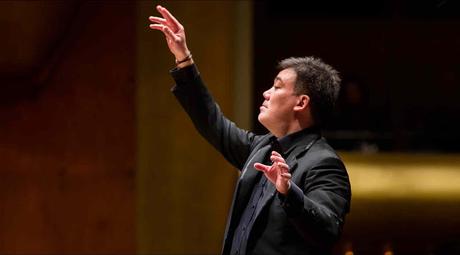by Paul J. Pelkonen

Alan Gilbert returned to the New York Philharmonic this week.
Photo by Chris Lee © 2017 The New York Philharmonic.
In a manner reminiscent of Mr. Gilbert's programming style, this was an an uncompromising slate, offering one new work alongside two lesser-known examples from the Bernstein catalog. Leonard Bernstein is among the front rank of 20th century American composers, but an audience is more likely to remember his Broadway music (West Side Story, On the Town) or his reputation as a conductor. His serious music: the three symphonies, for example, remain, not exactly neglected, but underperformed.
The concert started with a new work: the three-movement Boundless (Homage to L. B.) by Joey Roukens. This piece premiered at the Concertgebouw in Amsterdam, and was written as a companion piece to Bernstein's own Serenade (A Symposium). (The two works use similar orchestral forces.) It was easy to recognize the elder composer's characteristic voicings for wind and strings, and propulsive rhythmic writing for an expanded percussion section. That section dominated here, with Markus Rhoten's timpani moved to center stage (unusual at the Philharmonic) and he and a squad of five players taking an expanded role.
The first movement was kinetic and frenetic, a complex theme that rose from minor to major in the Bernsteinian manner but also established that Mr. Roukens, as a writer spoke with his own voice. The second (marked "Glacially") was just that, a mountain of unmoving, un-developing sound that thrilled with sheer mass and weight. In the third, a jittering Morse code became the source of complex variations, testing both conductor and orchestra with rapid fire tempos and exploding in a bright climax.
Joshua Bell is always a welcome guest at Lincoln Center and his arrival onstage was treated with much adulation. Here, he was playing the aforementioned Serenade. This is a a five-movement quasi-concerto that draws its inspiration from Greek science, drama and art. Each movement name-checks a different scientist, philosopher and author, speaking in praise of love. The violin serves as speaker, winding through the fabric of the orchestra. Its orations answered back by the rest of the players onstage, who comment on the initial melodic line. Like most mature works from Bernstein's pen, it could do with being heard more often.
Mr. Bell and Mr. Gilbert worked closely together in the first movement, an extended sonata which is among Bernstein's most formal creations. It. The violin sung the love-music of the second movement, in which Bernstein evokes the playwright Aristophanes, not as a comic figure but as a soothing storyteller. The middle movement was pure guts, with Mr. Bell racing through the changes over a quicksilver orchestra. In the Adagio, the spare orchestra provided surprisingly lush support, with the singing tone of Mr. Bell's instrument clear and pure over the ensemble. The finale was slow then fast, with Mr. Gilbert bringing groundswell of orchestration before Mr. Bell took the lead in the joyous final Rondo..
The concert ended with Bernstein's Jeremiah Symphony, his First. This also opens with a slow movement, a dirge in the manner of Bernstein's hero Mahler. It rolled slowly forward, with the Philharmonic playing with heart and soul in a manner unknown in the last years of Mr. Gilbert's reign. The middle movement (Profanation) was pure rhythmic fire, with taut fugues that burst forth in the strings before propelling the brass to new feats of contrapuntal heroism. Following this, the slow finale, with mezzo Kelly O'Connor singing texts from the Lamentations of Jeremiah was somehow anticlimactic. It was powerful and wonderfully performed but the previous movement had stolen the show.

